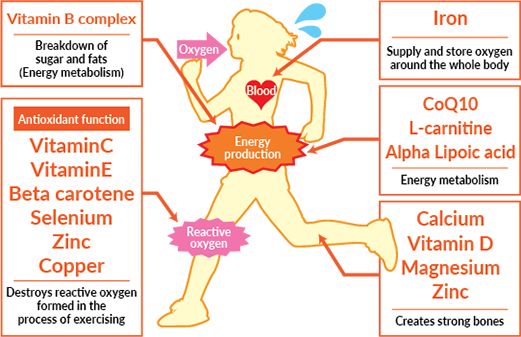What Does Sports Nutrition Mean?
What Does Sports Nutrition Mean?
Blog Article
Sports Nutrition Things To Know Before You Buy
Table of ContentsThe 30-Second Trick For Sports NutritionAll About Sports NutritionSports Nutrition for BeginnersThe smart Trick of Sports Nutrition That Nobody is Talking About
Researchers with a background in sports nutrition may likewise discover expert roles with firms that establish nutritional supplements and other items targeted at athletes. As an example, a sports nutritionist in such a placement would likely investigate various components in an item, gather the most recent scientific research study about them, and encourage business on which products to choose or prevent.
Sports nutrition is occasionally controversial and criticized. In its purest form, sports nutrition manage natural nutrients that can be gained or derived from foods and water. The surge in availability, popularity, and strength of numerous kinds of supplements, however, commonly obscures the difference between acceptable sports nutrition and "doping," or making use of drugs known to enhance athletic efficiency.

The Only Guide to Sports Nutrition
Some compounds are banned during affordable events, while others are always prohibited. Athletes that test positive for such materials may be prohibited from contending in an event. In many cases, post-event examinations uncover evidence of previous doping. If that takes place, the results of the event may be changed to show this.
Experts encourage that professional athletes, specifically those on the specialist level, and their nutritionists be incredibly cautious concerning their selections. Also some seemingly harmless supplements may contain trace amounts of outlawed substances that can lead to disqualification and other repercussions. USADA has recommended that professional athletes continue to be constantly familiar with the choices they make, as they are responsible for whatever they eat, drink, or take right into their bodies in otherwise.
Some sports, such as martial arts, categorize athletes by weight course. Professional athletes have to strictly adapt to these classes; appearing at the main pre-event weigh-in even an ounce too light or too hefty might lead to cancellation of the occasion or serious permissions by the event sites coordinator. Therefore, lots of athletes undertake extreme and usually dangerous programs of weight-cutting that commonly include purposely dehydrating themselves to lower water weight.
Dehydration might lead to numerous threats for the body. An absence of sufficient water is most likely to reduce the quantity of blood circulating in the body.
Sports Nutrition - An Overview

An individual usually does not feel thirsty up until dehydration has actually currently established in. For athletes, that indicates that the body is already weakened by lack of water before the signal of thirst appears. For look at this now that reason, professional athletes might consume water regularly, without waiting for thirst, to stop the beginning of dehydration.
Sports Nutrition. Careers in Sport. Nutrition Overview: Reach Your Optimal Efficiency Naturally.
Find out the distinction between creatine and whey protein. Concerning fifty percent of your body's supply of creatine (1 to 2 grams/day, regarding the size of 1 to 2 jellybeans) originates from your diet plan, especially protein-rich foods such as: Red meat (pork, veal and beef). Fish and shellfish (fish and shellfish). Pet milk (like cow, goat and sheep milk). Your body produces the various other fifty percent naturally in your liver, kidneys and pancreatic.
Suppliers likewise make creatine supplements. Some people take creatine supplements because they function out a great deal or do not get adequate creatine in their diet. Researches show that it's risk-free for several people to take creatine supplements.
Facts About Sports Nutrition Uncovered
Hockey. Fumbling. Furthermore, studies suggest that creatine supplements might help mind function in people 60 and older. This includes: Short-term memory. Thinking. Neuroprotection (maintaining groups of nerve cells risk-free from injury or damage). Scientists are still my latest blog post researching whether creatine supplements might help people with cognitive (mental) conditions, including dementia. Speak to a doctor before taking creatine supplements, regardless of your level of fitness, age or health - Sports Nutrition.
Expert sports organizations, the International Olympic Committee (IOC) and the National Collegiate Athletic Association (NCAA) all allow athletes to make use of creatine supplements.Men and females report advantages to utilizing creatine. However some researches note that ladies may not acquire as much strength or muscle mass as males. The most usual creatine supplement is creatine monohydrate.
Report this page